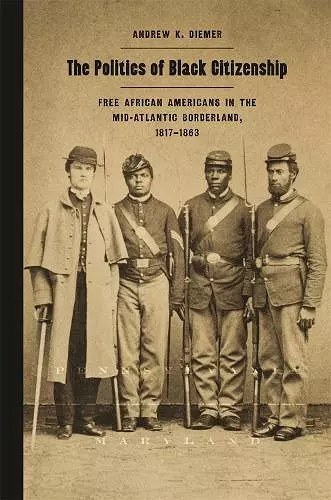The Politics of Black Citizenship
Free African Americans in the Mid-Atlantic Borderland, 1817–1863
Format:Hardback
Publisher:University of Georgia Press
Published:15th Jul '16
Currently unavailable, and unfortunately no date known when it will be back

The crucial and active role of free African American communities in the development of antebellum politics
Considering Baltimore and Philadelphia as part of the Mid-Atlantic borderland, Diemershows that the antebellum effort to secure the rights of American citizenship was central to black politics as it exploited the ambiguities of citizenship and negotiated the complex national, state, and local politics in which that concept was determined.
Considering Baltimore and Philadelphia as part of a larger, Mid-Atlantic borderland, The Politics of Black Citizenship shows that the antebellum effort to secure the rights of American citizenship was central to black politics—it was an effort that sought to exploit the ambiguities of citizenship and negotiate the complex national, state, and local politics in which that concept was determined.
In the early nineteenth century, Baltimore and Philadelphia contained the largest two free black populations in the country, separated by a mere hundred miles. The counties that lie between them also contained large and vibrant freeblack populations in this period. In 1780, Pennsylvania had begun the process of outlawing slavery, while Maryland would cling desperately to the institution until the Civil War, and so these were also cities separated by the legal boundary between freedom and slavery. Despite the fact that slavery thrived in parts of the state of Maryland, in Baltimore the free black population outnumbered the enslaved so that on the eve of the Civil War there were ten times as many free blacks in the city of Baltimore as there were slaves.
In this book Andrew Diemer examines the diverse tactics that free blacks employed in defense of their liberties—including violence and the building of autonomous black institutions—as well as African Americans' familiarity with the public policy and political struggles that helped shape those freedoms in the first place.
The Politics of Black Citizenship is the latest addition to the University of Georgia Press’s Race in the Atlantic World series. In it, Andrew Diemer examines how free black people used a loosely defined concept of citizenship to claim full participation and membership in the American Nation. . . . Unlike most other studies of antebellum black citizenship, however, Diemer’s work looks at activism in both a free state and a slave state.
* Register of the Kentucky Historical Society *Diemer recovers black voices and ideas: from a multitude of sources, we hear black Americans thinking about and carefully defining their rights as citizens. Although these sources often registered important disagreements or gave evidence of distinctive backgrounds and divergent social classes, they nevertheless reveal unceasing political engagement rather than retreat in the face of a virulent racism. The Politics of Black Citizenship provides overwhelming evidence of free African Americans’ great force in arguing for the protections and rights conferred by citizenship.
* Journal of American Ethnic History *Diemer's borderlands framework is both compelling and promising. Like other nineteenth-century studies that have focused upon the upper South and lower North as a borderland, it paints a picture of a region wrought by contested power, complex politics, and pervasive violence. It also suggests that an area so often imagined as a terrain of black subjugation could simultaneously be one of black liberation.
* Journal of the Early Republic *This deeply researched and well-written study challenges us to look beyond the confines of one city and admire how adroitly marginalized people maneuvered to safeguard the rights they had and push for those they knew they were entitled to.
* Journal of American HistoISBN: 9780820349374
Dimensions: unknown
Weight: unknown
272 pages